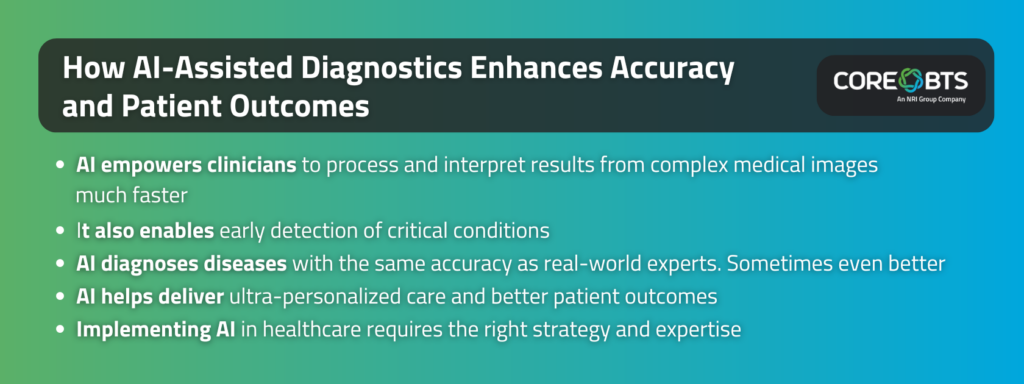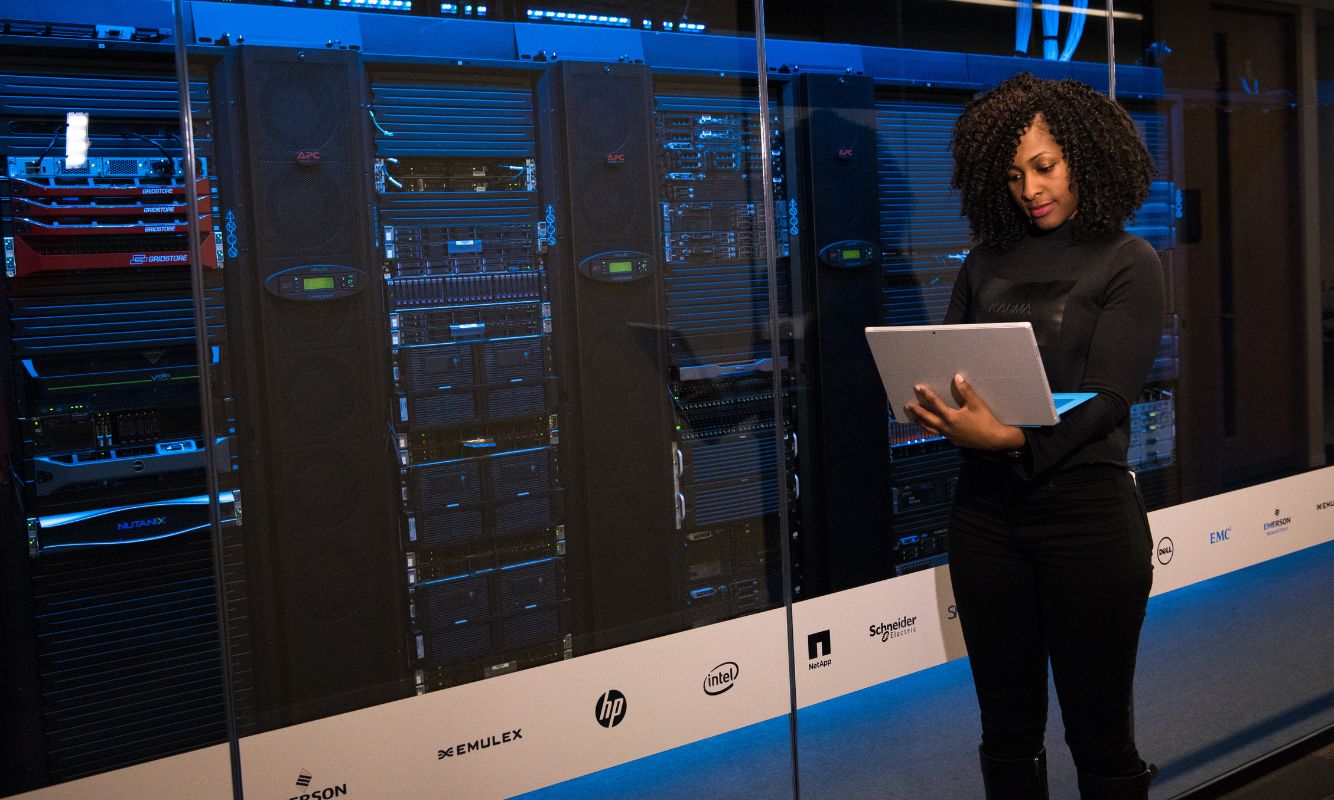Increasingly, the question isn’t whether to adopt AI in healthcare but how quickly to implement it. Every day without AI is a missed opportunity to improve operations and patient outcomes. Discover the benefits of AI-assisted diagnostics and start enjoying them today.

Imagine if your healthcare organization could provide accurate diagnoses in seconds—every time. That means no missed symptoms or delayed treatment—just fast, effective, personalized patient care based on the latest medical insights.
You’d save countless lives, and you’d also alleviate the unnecessary pain patients often experience when critical conditions are not discovered early.
This is all possible with artificial intelligence (AI) today.
As this article will show, organizations that have put their best foot forward in the AI race have achieved remarkable results. And they are miles ahead of everyone else. The good news is you, too, can join them by strategically implementing the most valuable AI use cases.
Read on to discover how AI enhances image analysis, early detection, diagnostic accuracy, and patient outcomes from real-world success stories. You’ll also learn how to implement AI-assisted diagnostics successfully with help from a reliable digital transformation partner.
Four Ways AI is Transforming Healthcare
1. Supercharging Image Analysis
Recent AI advancements have completely changed how we identify patterns and anomalies. For example, AI algorithms based on deep learning models, like convolutional neural networks (CNNs), now allow clinicians to interpret the most complex medical image details.
These AI algorithms also empower clinicians to process images and interpret results much faster, considerably reducing the time it takes to diagnose a patient. This means those on the frontline can finally focus on delivering care without getting bogged down in traditional manual processes, which are time-consuming and prone to errors.
2. Enabling Early Disease Detection
As you can appreciate, medical treatment is more effective with early detection and intervention. The problem is that symptoms don’t always manifest early. Doctors and patients may sometimes only discover a disease at an advanced stage.
To illustrate, Physicians usually focus on answering a primary clinical question when examining chest X-rays (CXRs), CT scans, and other imaging films. Because of huge workloads and clinical demands, they may not scrutinize imaging films for coincidental lesions, pathologies, or diseases. This means a lot can slip through the cracks.
The good news is that it doesn’t have to be that way. With AI, clinicians can perform end-to-end screening and incidentally diagnose critical diseases they would otherwise miss.
3. Enhancing Diagnostic Accuracy
AI also renders diagnoses with surprisingly high accuracy. It is an excellent tool for screening and triaging patients to determine those needing urgent medical care.
You may have heard of the groundbreaking research from University College London (UCL), DeepMind Health, and Moorfields Eye Hospital, which uses AI to diagnose potential blinding eye diseases.
The researchers trained the AI model on thousands of historic depersonalized eye scans. As a result, it can predict over 50 eye diseases with 94% accuracy. You read right—94%—that’s about as accurate as real-world experts!
And the model isn’t limited to identifying life-threatening eye diseases, either. It accurately predicts general health conditions like Parkinson’s disease, stroke, and heart attack.
In some cases, AI makes better diagnoses than actual doctors. A recent Cambridge University study demonstrates that while AI model GPT-4 diagnoses eye problems just as well as specialist doctors, it significantly outperforms general doctors.
4. Enabling Personalized Patient Care and Better Outcomes
In an ideal world, every patient receives ultra-personalized care. AI brings you closer to that reality.
For example, with AI, you can:
- Leverage prediction models to perform comparative analyses of potential drug interactions and their side effects based on patient profiles. This allows for targeted therapies and medications while minimizing risks and side effects.
- Manage extensive data sets to formulate optimal treatment plans for complex conditions.
- Analyze data to identify patients at high risk of hospital readmission and use targeted interventions to prevent it.
There are many more ways AI can help you deliver better patient outcomes and use healthcare resources efficiently. Ultimately, AI integration in healthcare is a win-win for all those involved—patients, clinicians, and the institution.
AI Integration into Medical Practice: Bridging the Gap
You might think, “This sounds great, but how do I implement AI in my healthcare organization?” That’s a fair question. Integrating AI into medical practice isn’t like flipping a switch—it’s more like cultivating a garden. It takes time, care, and the right strategy.
The first thing you’ll need is AI expertise. A reliable AI transformation team can help in many areas, including:
- Avoiding algorithmic bias
- Establishing robust privacy and security controls around AI use
- Upholding compliance with relevant regulations
If your bench lacks enough depth, consider enlisting the services of a reputable healthcare AI solutions partner.
With a team in place, start small. Collaborate with frontline medical staff and key stakeholders to identify areas where AI could significantly impact patient outcomes. From there, implement a pilot program using a phased approach and gradually expand to other areas as you see results.
While you do this, remember that AI is a tool to augment your staff’s capabilities, not a replacement. Make this clear to everyone whose role will be impacted to minimize resistance. Additionally, comprehensive staff training should be provided to ease the transition.
Embrace the Future
Make no mistake. AI-assisted diagnostics is the future of healthcare. The question isn’t whether to adopt AI but how quickly you can implement it. Every day with AI is an opportunity to improve care and save lives. So, why not embrace it immediately?
Once you leverage AI, you’ll never look back. You’ll immediately enhance medical diagnosis accuracy and efficiency, drive better patient outcomes, and unlock possibilities previously beyond reach.
Next steps
We recommend you read our e-book, “The New Economics Of AI,” before starting your AI transformation. In this in-depth guide, you’ll learn the cost of integrating AI into operations today so you can plan and budget accordingly.
Remember, AI won’t slow down anytime soon. Your organization’s future depends on embracing the technology efficiently and effectively. That’s where Core BTS comes in.
Our team can help you:
- Identify the most valuable AI opportunities for your healthcare business
- Evaluate whether you have the technology, processes, and people to maximize AI benefits
- Craft a comprehensive roadmap and change management plan to ensure a smooth AI transformation
Get a custom AI readiness assessment and learn how to harness today’s and tomorrow’s most impactful technology.
The future is knocking at your door. Will you answer?





Share on